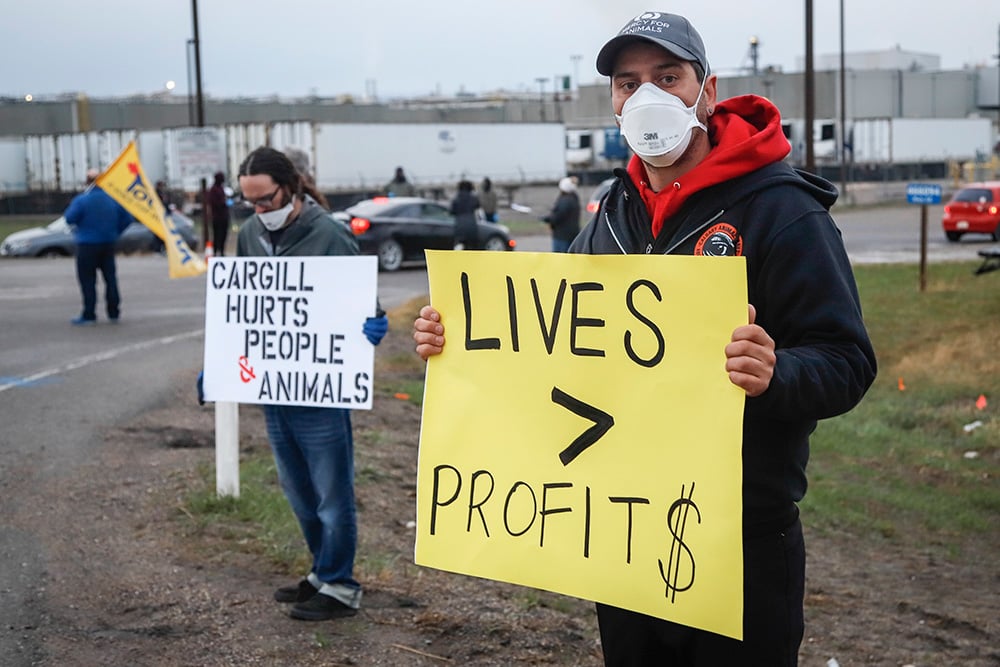“Not wanting to know how the sausage is made” is a common expression used to refer to all manner of unseemly processes that we don’t want to think too hard about.
But the COVID-19 outbreaks at meat processing plants in Canada, in particular at the Cargill plant in High River, Alta., have reminded us why this phrase is firmly rooted in the slaughterhouse.
These massive outbreaks — almost half the Cargill plant’s 2,000 employees tested positive for COVID-19 — have revealed the high price of our unwillingness to pay attention to conditions in these giant industrial operations.
We live in perpetual denial about the path meat takes to our plates. Where earlier arguments against meat consumption have centered on animal rights, climate change and even promotion of healthier lifestyles, we now have to consider outright human suffering.
The majority of workers in the Cargill plant, now recognized for the dishonourable distinction of having the largest single COVID-19 outbreak in North America, are immigrants and temporary foreign workers. They have come to Canada in pursuit of better lives for themselves and their families.
In a 2016 post on the company’s website, the Minnesota-owned Cargill boasts about these workers as a success story. “About 92 per cent of the workers who have come to High River through the [Temporary Foreign Worker] program have attained permanent residency in Canada,” the post says. “The vast majority have chosen to continue working for Cargill after doing so, even though it’s not required.”
By the company’s own admission the plant could not operate without foreign workers. A 2013 PowerPoint presentation from Cargill outlines the problems it faced prior to the renewal of the Temporary Foreign Worker Program in 2007. “The number of employees was at its lowest — 1,483 employees — when the needs were for approximately 1,720 workers,” it says.
One of those workers, Hiep Bui, died on April 20 at 67 after contracting the virus. She and her husband of 23 years had come to Canada as refugees from the Vietnam War. Three deaths have now been linked to the outbreak.
Yet the plant has already reopened. With 40 per cent of Canadian beef products coming from the facility, officials have claimed it is an essential service.
The huge concentration of meat processing in a handful of giant factories has consequences. And we need to consider our role in creating megafactories that process animals into shrink-wrapped products for grocery stores.
We must acknowledge that if these jobs are being performed by immigrant labourers because no local workers can be found, we have in effect failed to deliver promised equality to these people.
We haven’t just imported workers. We have established an industry that relies on people willing to work under conditions — on safety, labour standards and pay — that born-and-raised Canadians have rejected as substandard. Essentially, these workers are second-class citizens in the country they want to call home, performing dangerous work that people who have been in the country longer refuse.
And if we recognize this inequity, we must recognize our role as consumers in creating and sustaining it. This is a collective responsibility, and so merits collective action.
We can take that collective action immediately and easily by joining a growing movement and buying local.
The power of the public in responding to this issue lies in our ability to shift consumer demand, the basis for the argument that these plants must stay open. Choosing to buy products from local businesses instead of foreign-owned corporations would be a statement of solidarity.
Resources for buying local are in abundance. The website BC Meats offers a list of local meat producers by product and region. Consumers who are fond of the “dinner box” delivery model can check out truLOCAL for a variety of meat products from sustainable farmers and ranchers, with options for Ontario, B.C. and Alberta. And the website BC Farm Fresh offers listings for local farmers by product, region and service features, including 15 different beef sellers.
COVID-19 has been a uniting force for common decency in the form of social distancing, collective support and community building.
That decency must now extend to how we choose our food. Buying locally-sourced meat products demonstrates that we will not trade human dignity for our own comfort or convenience, and places the onus back on the industry to rectify issues of safety and offer fair treatment for workers.
This consumer pressure doesn’t need to cost workers their jobs — increased demand among local businesses would see new positions created and push the industry to compete for qualified workers by improving working conditions and safety standards.
The COVID-19 outbreak at Cargill has pulled aside the curtain on “how the sausage is made” and revealed the cost in human lives. Will we now go back to denial, or take action?
Hiep Bui and her husband saw Canada as a safe place for immigrants. We owe it to them to make it so. ![]()
Read more: Health, Rights + Justice, Food, Coronavirus, Labour + Industry
















Tyee Commenting Guidelines
Comments that violate guidelines risk being deleted, and violations may result in a temporary or permanent user ban. Maintain the spirit of good conversation to stay in the discussion.
*Please note The Tyee is not a forum for spreading misinformation about COVID-19, denying its existence or minimizing its risk to public health.
Do:
Do not: